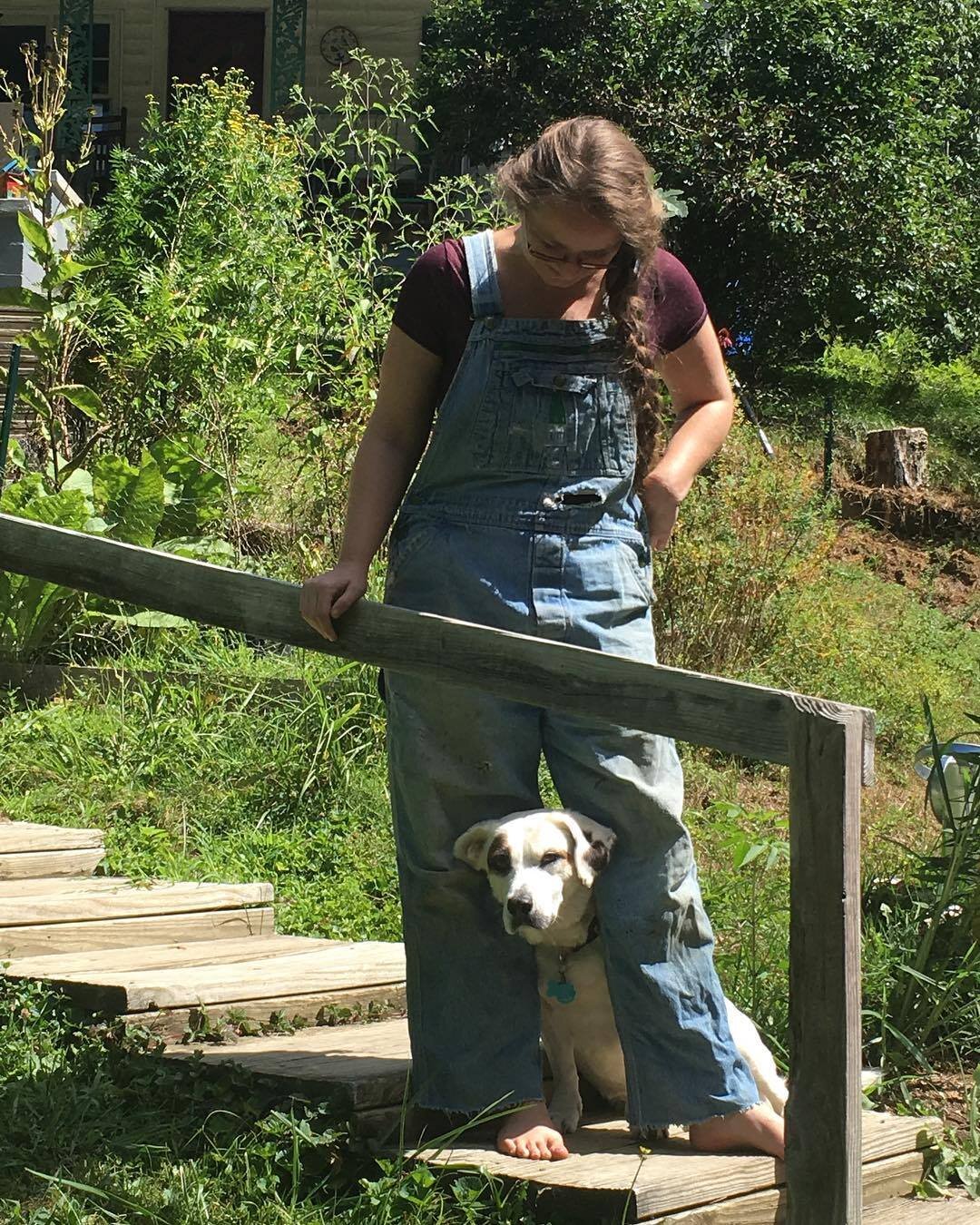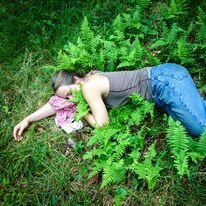Annie Jane Cotten is an artist, storyteller, herbalist, and an organizer at the Letcher County Culture Hub in Eastern Kentucky. They live in a hundred-years old log cabin just outside of Letcher County in rural Knott County, Kentucky. “It’s only the second time in my adult life that I haven’t had only a wood stove as a heat source. Sometimes I’m not sure I like it, actually. The power went out on Christmas Eve, and I was like, what do people do when the power goes out if they don’t have a wood stove to stay warm? I still don’t understand.” Annie Jane spoke about the profound impact this place and its people have had on her. “I'm in a place that has a huge artistic and cultural history—very deep, very rich—and also people like to make a lot of assumptions about this place, calling it Trump Country and hillbillies and rednecks, all the stereotypes you hear in this world. But my experience over a decade has been much more diverse and much more rich. Rich is a good word for that.”
Born and raised in a small town Crystal Springs, Mississippi, Annie Jane lived in central Mississippi until she was 17 and decided to uproot and move to northern Wisconsin. “I had never been further north than Columbus, Mississippi, so that was a thing that I did! Certainly a lot of culture shock and a lot of world opening all at once.”
“Long, long story short, I ended up in Central Appalachia about a decade ago doing direct action, a lot of direct action work against mountaintop removal, and water quality and community organizing work around coal slurry and other impacts from mining.” Over time her community organizing work evolved into bringing folks together across socioeconomic and political lines for the common goal of economic development and growing a thriving future for the region, ensuring that that future “is rooted in the arts and culture of that place and also that those creative endeavors and those creative pursuits, when they generate notoriety or economic benefits actually stay within the communities that are producing the work.”
Annie Jane draws a direct link between the region’s long legacy of labor and resource extraction and the extraction of its artistic and cultural production. “That history of extraction in Appalachia extends beyond natural resources but also to cultural production and artistic production as well. So a lot of work that is about finding similarities instead of differences and creating opportunities that can highlight and embrace what is possible when we come together across those socioeconomic and political lines.” She comes to the work of community organizing with years of experience and wisdom about bringing folks together across lines of difference, which she generously shared with us.
“Try to work with the people close to you and around you and in your networks and in your community from a place of humbleness and a place of openness. We talk a lot about how this country is so divided, and certainly current events make that feel even stronger and more pressing, maybe. And yet, I have never found that communities, even when they’re disparate or politically divided or socioeconomically divided, when you create the container and the space for people to come together with humility, with openness, with respect as baseline, regardless of your difference, that is probably one of the best starting places I can think of. That’s that fertile ground for connection, for imagining, for growing together, for building something stronger.
The primary thing is that it comes with a requirement that you are open to experiencing the humanity of other people regardless of your differences with them. I guess that would be the first place I would start. [...] It is not always a delicate process. Sometimes it’s a rowdy process. Sometimes it’s a very, inflamed process I would say. And yet, if you are committed to one another as human beings, I think that’s the best place to start. Oh, to be willing to understand other people deeply.”
Annie Jane has always felt most at home in rural spaces, almost exclusively living in rural communities with the exception of New Orleans in the aftermath of Hurricane Katrina. “There are all these stereotypes of this region, but the reality is that people here are so wise, they’re so resilient, they’re so smart, they’re so in touch with each other and the larger world. It’s always impressive.” Annie Jane recounted the many ways that their rural community has shown up for one another in the midst of the global pandemic.
“It’s incredible the amount of solidarity and tenacity and creativity out here. You know, we’ve managed to serve millions of meals throughout the counties. We have had to rearrange everything from church services to community meetings. Like every community, we’ve really had to adapt, but the strength of folks around here is the ability to be creative, resourceful, and resilient. [...] Peoples’ inherent ability to adapt and meet challenges head on with a sort of no-nonsense practicality has been in full swing—‘here we go, we’re doing it!’ At the same time, being really creative in creating opportunities that weren’t there before. Finding ways to expand meal sharing programs, finding ways to create art and music even through this whole experience has been so beautiful. It’s been really beautiful to see. Of course, as per always, people around here know what’s up.”
Annie Jane offered us beautiful stories of the ways that folks practice their commitment to one another in the hills and hollers of Eastern Kentucky, and at the same time she did not shy away from the complexity and challenges of practicing reciprocal community, particularly in primarily white communities. “Commitment to one another does not mean aquesience. It does not mean a lack of standards. It does mean shared common values and agreements and beliefs. It does not mean that people can do whatever they want and still be a part of your community. But those lines are difficult. They’re difficult to draw, they’re difficult to speak. And they’re difficult to navigate and even establish. [...] I think as white folks, working in white communities, we do have that responsibility not to side step white supremacy, not to side step fascism and racism in our country, and to instead engage people around those topics, even when it really sucks and it’s really hard. You often get pretty far when you can talk about things you agree on, like people should have access to certain care, you know?”
“We have to talk to them about that, we have to be willing to engage both the beautiful hopeful—‘we’re going to build economic recovery in our region with art and culture!’—but we also have to say—“and we’re going to talk about racism, because it’s real!”—you know? And it’s not always easy to hold those things but it’s necessary. I don’t think we get out of that. I don’t think we get to avoid that. I think if we avoid that, we are doing a great disservice to our communities.”
In our conversation with Annie Jane, she revealed, again and again, the ways in which rural Appalachian communities are models for practicing the values of reciprocity and community care; the ways in which rural Appalachian communities are centers not just of extraction, but of artistic and cultural innovation, community organizing, and all the mundane, joyous, tragic, and beautiful stuff of living in commitment to each other.
“Stories shape you. So, to be a storyteller is to be someone who deeply wants to understand other people and to know them in a real way. And to be known! And to me that’s such a fundamentally human desire. So, honing that skill, creating a space where, you know, stories can emerge as strong as an oak tree in your yard. They are part of you, they are part of this world. They not only tell us what’s been happening before, the history of our world, but they also shape the future, what stories we tell, how we tell them, who we lift. It’s just so fundamental to me. [...] There are just so many ways we tell the story of our hopes and our dreams and the world that we want to live in and who we are in that world. I’m not sure that anything we do isn’t art or a story.”
What is Appalachia?
“A story, a song, a quilt, a heart, a hand, a dream, a forest, and town. Rooted, complex, various. Gorgeous. Brutal. Appalachia is the space between my heart and hands and the place I lay my head.”



